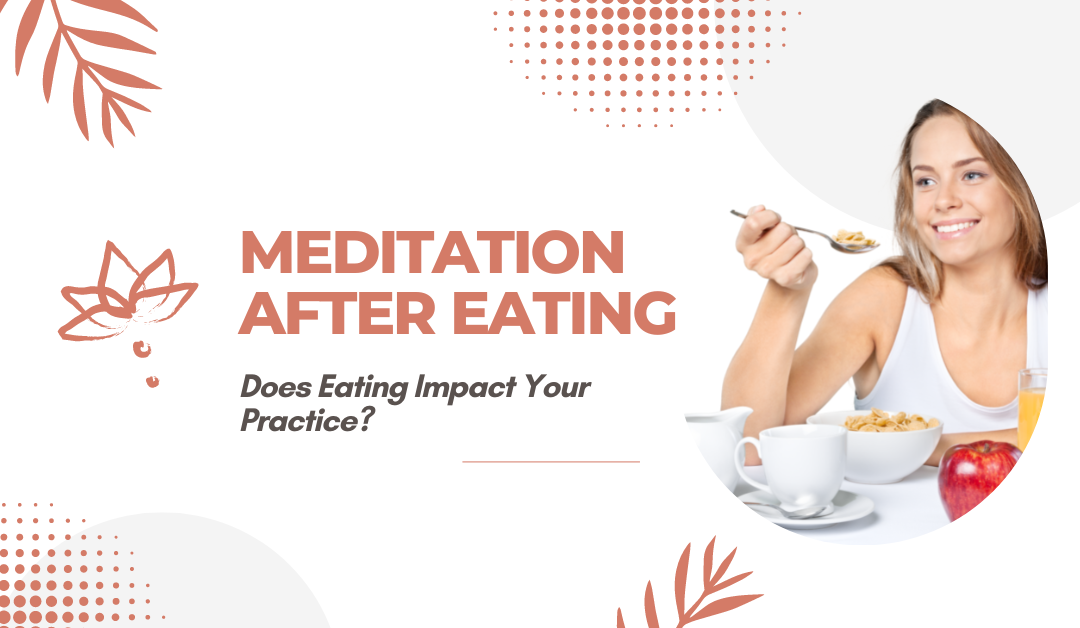Meditation after eating is a topic that a lot of new practitioners are curious about. The main idea is that you are what you eat. If you eat anything from a piece of meat to a leaf, a chemical reaction occurs in the body to digest it.
However, does it really matter when you meditate?
And how long should you wait after eating before meditation?
We’ll be exploring the topic of meditation after eating and multiple concepts of why you should and shouldn’t eat before meditating.
Can I Do Meditation After Eating?
Yes, you certainly can. In fact, as we’ll see below, some people use eating beforehand as a tool to train and advance their meditation practice. This isn’t to say that it’s something everyone should do because there is a time and place for meditation and eating.
Meditation Before or After Eating: What’s Better?
Are you a meditation beginner?
If so, try not to eat before meditating.
Why?
- You’re just starting out in your practice and need to devote your best-self to the practice.
- Food can make you feel tired, uncomfortable and lethargic.
For example, imagine eating a big bowl of pasta with some garlic bread before meditating. When you do this, the carb-heavy meals will cause your blood sugar to spike and energy levels to soar.
Quick digestion then leads to massive energy expenditure and a crash.
However, let’s assume that you just ate and went right into your meditation. You may feel bloated and not tired just yet. You sit down, grab your meditation balls and begin meditating.
Initially, you feel great and then digestion begins to work its magic. The sugar in the carbs will then cause:
- Energy levels to spike, which may make it more difficult to concentrate and pay attention
- Bloating and stomach discomfort, which can negatively affect your meditation
- Digestion works to breakdown your food and massive energy expenditures happen
Due to all of these factors, if you eat before meditating, it can have a negative consequence on your meditation. With that said, you might eat something less carb-heavy and be fine. You might be able to meditate with greater ease if you eat something, such as:
- Fruits
- Nuts
- Salads
Light meals without sugar or any artificial ingredients tend to work best because they’re easier to digest and won’t require a massive amount of energy to breakdown. Overeating is never a good idea before meditation because it’s likely to lead to a wasted meditation session.
If you’re starving before you meditate and it’s causing you to feel uncomfortable and lose focus, then, by all means, sit down and eat a meal.
There’s also a train of thought that when you eat, it pulls your energy into the digestive system, which makes sense. Your body needs a lot of energy to digest your food, but your meditation will push your energy toward the spiritual eye.
I don’t know for sure where the energy goes when you meditate, but if your energy does move away from the organs when meditating, it may not be the best idea to eat before meditating,
Again, I have no way to verify this energy transfer, but if it’s true, then you’ll want to wait three hours after eating to begin meditating.
Many people prefer fasted meditation because it eliminates the risk of food impacting your practice. However, there are also a lot of people who state that “eating or not before meditating doesn’t matter.”
Quick Hack: Digestion begins once you chew your food because your salivary glands will release saliva to move the food through your digestive system. However, a quick 10-minute meditation can often be done right after eating without feeling tired or bloated just yet.
Why Meditation After Eating Shouldn’t Matter
Meditation is a tool that helps you gain control of your thoughts and mind. If you read through this thread on Reddit, you’ll see that someone poses the question of if you can meditate after eating dinner, lunch or breakfast.
The poster even states that it’s a “no no” to eat before meditation.
However, a deleted comment states “that’s just a tip for when you’re starting out,” when referring to eating prior to meditating. He states that meditation is an “all-condition habit,” meaning that you should be able to meditate at any time.
And this is the concept that I stand by for anyone who has been meditating for any length of time.
Meditation should allow you to practice when you’re:
- Hungry
- Full
- Sad
- Angry
Life is filled with amazing moments – good, bad and uncomfortable. If you continue meditating, you’ll find that it’s a practice you can rely on any time of the day and under any circumstances.
3 Things to Consider Before Deciding to Meditate Before or After Eating
- Are you starving when you go to meditate and find that you can’t focus? Perhaps you even have stomach pangs. If this is the case, eat a little something before meditating and see if it helps.
- Do you find that eating makes you lose focus? If so, try eating while fasted to see if it helps.
- Do you feel bloated after eating? Sometimes, bloating can be utterly distracting and you should avoid eating before meditating.
So, should you practice meditation after eating?
There’s no right or wrong answer.
If you’ve been meditating for a long time, you may find that you’ll reach a higher level of practice meditating on a full stomach. However, for beginners, being cautious of the foods you eat before meditating (or not eating at all) may be better for you.
If you simply find that practicing in a fasted state works best, meditation after eating is not something for you. The key is to meditate the way that you prefer and feels best for you.

